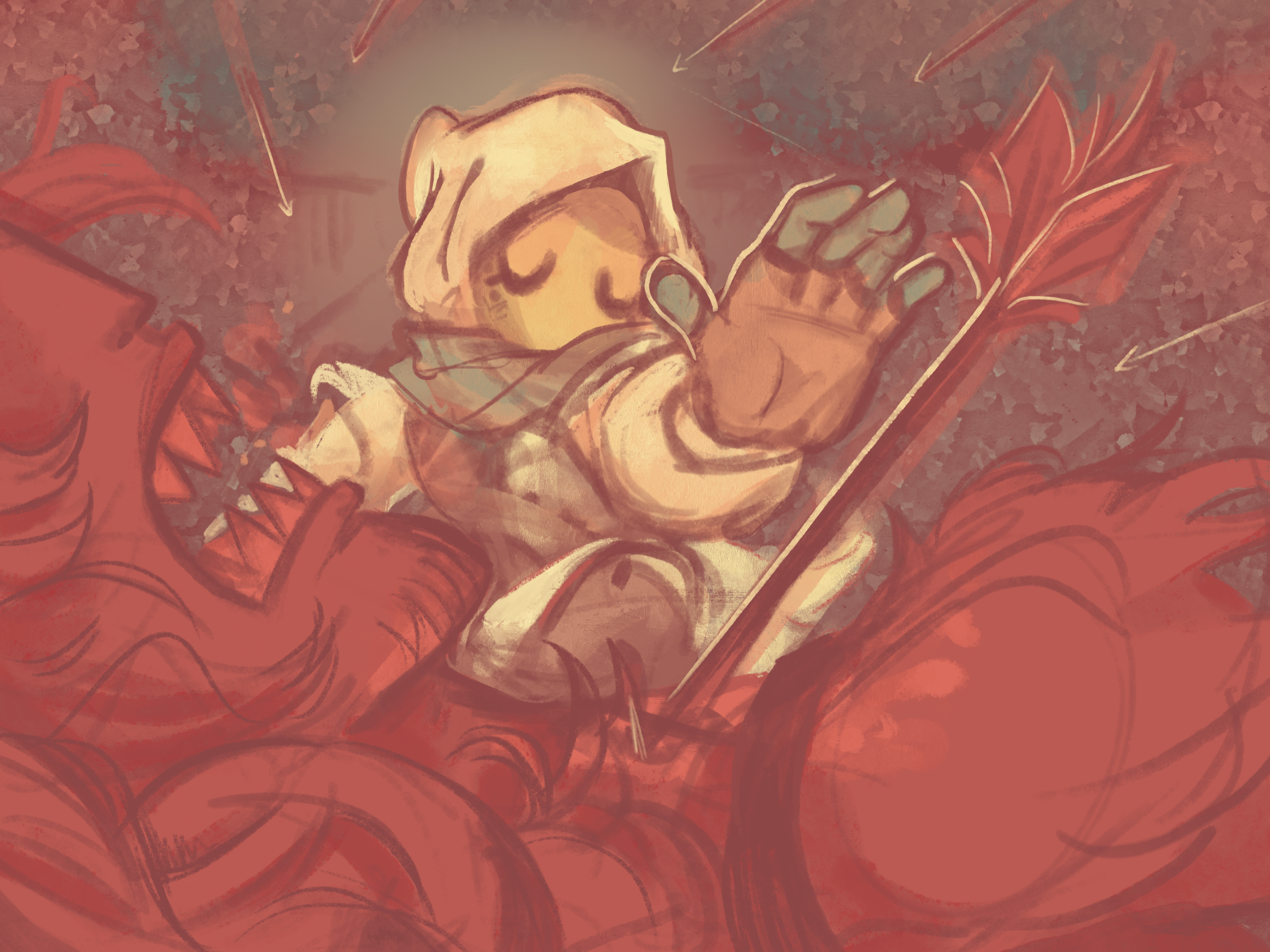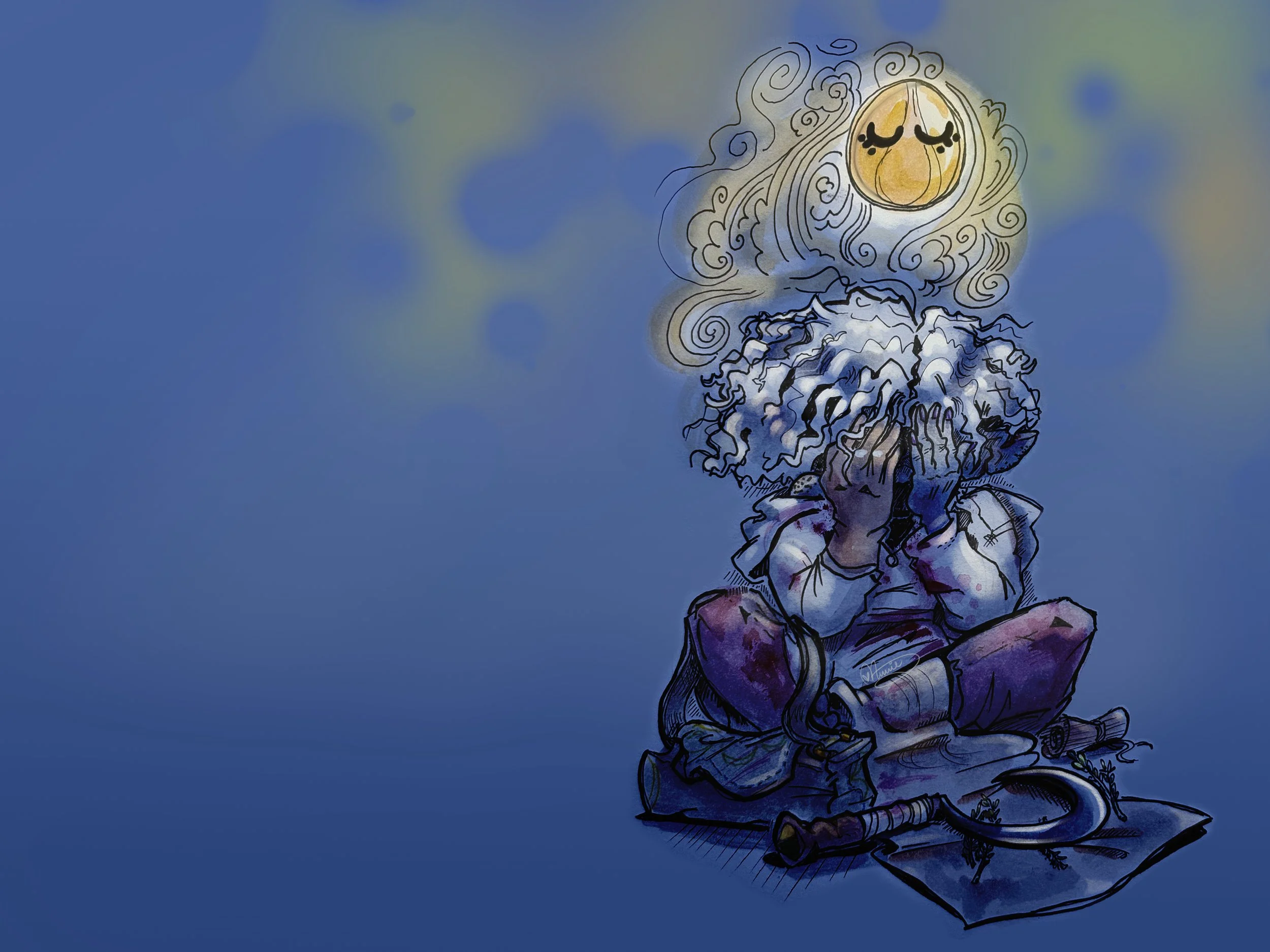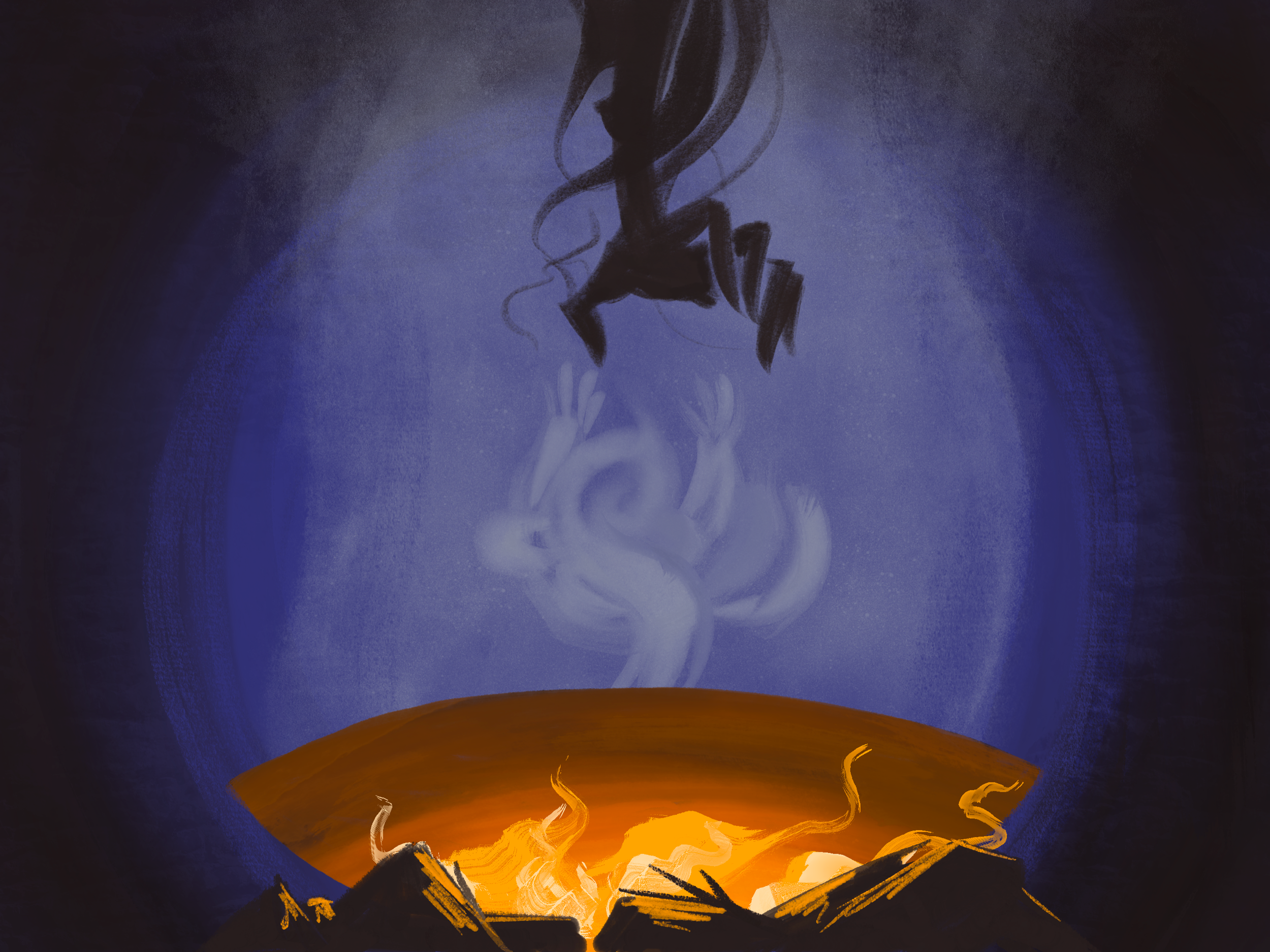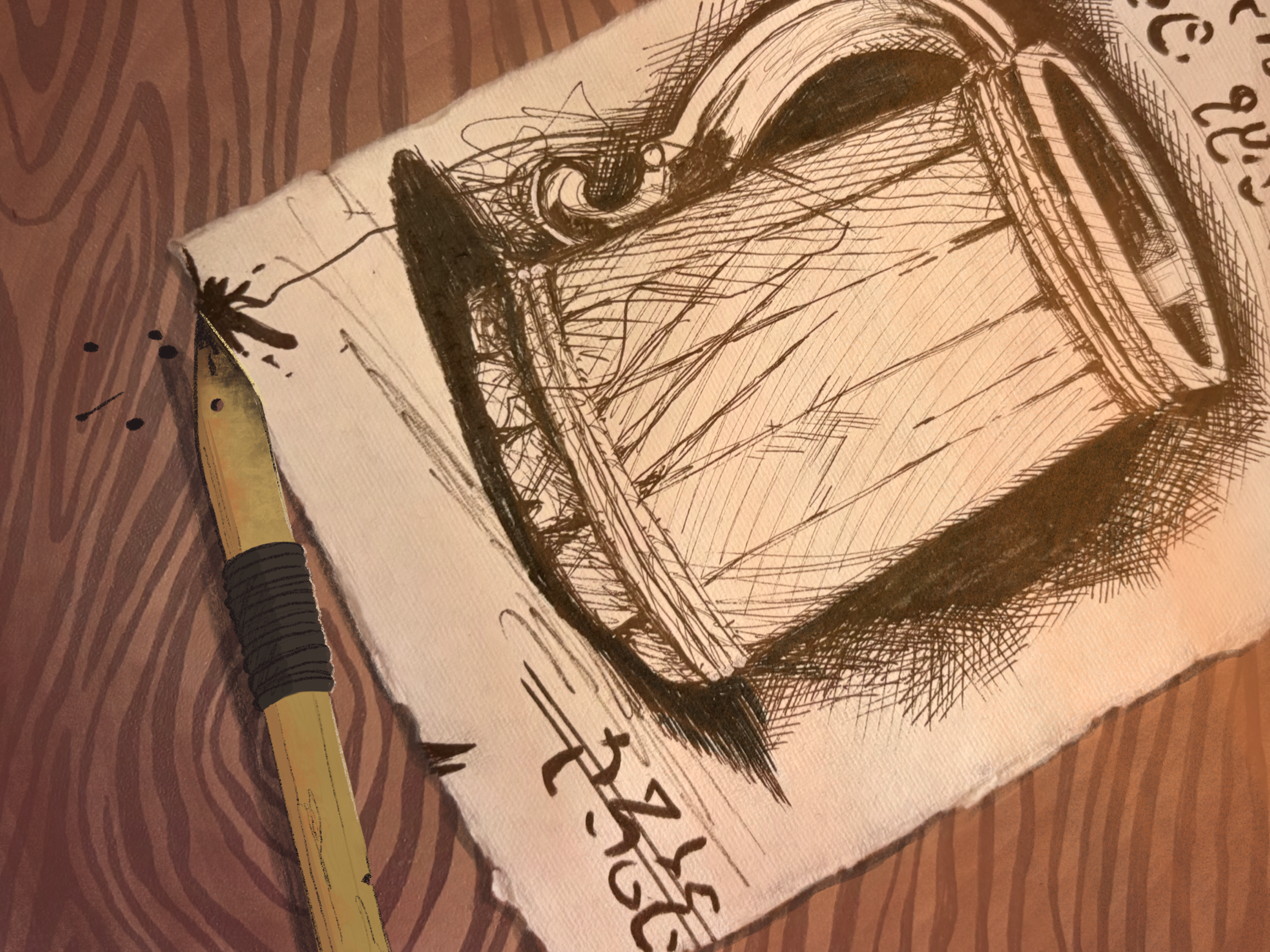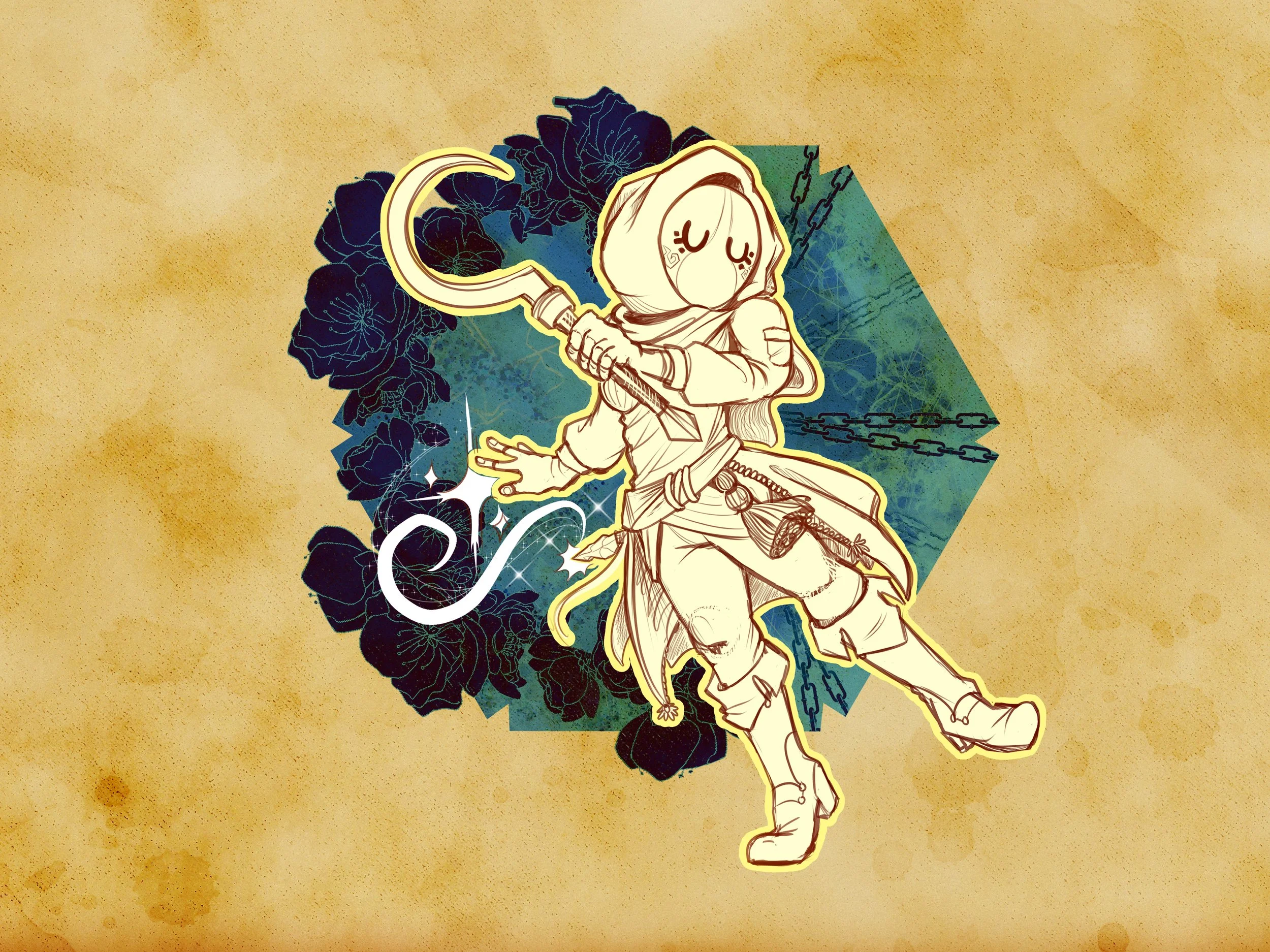Fanesca: Entry Fourteen
Bead of destruction
Fourteenth Entry
It was late enough that most villagers had retreated indoors, but not so late that the roads had emptied. The tavern’s music was still a distant thrum behind me, and the occasional candlelight flickered behind shuttered windows. The moon had risen fully by now, and the streetlamps lined the paths like attentive sentinels. Not that I needed them—my svirfneblin eyes cut through the dark just fine.
I wandered the edge of town, along the humble farmlands near the halfling settlements. My pace was slow, deliberate, fingers trailing lazily near the fences. I was dowsing, or… something akin to it.
Wizards learn their reagents in towers. Clerics are guided by their calling. But I—well, all sorcerers, most likely… just felt things. Little sparks of magic nestled inside mundane things. Ordinary, useless to others, but not to me. I can sense potential. Like knowing where a story begins, even if you don’t yet know the ending.
That night, it came from a line of pale, lumpy pebbles scattered directly under the fence line.
I crouched and peeled off my gloves, fingertips tingling. The pieces were slightly soft—clay-like, almost. Malleable, yet strange. As if waiting for something else to complete them. That little buzz, that half-finished magical hum… it was very distinct. It reminded me of the sulfur I had pocketed some time ago.
I smiled to myself. A pair of puzzle pieces!
I gathered the pebbles—carefully—into a folded kerchief, stowing it in my tunic’s pocket. I was just about to move on when a voice broke through the silence like an unexpected spell:
“Why’re you pickin’ up bat droppings?”
I yelped and shot right up to my feet. I looked back sharply and there he was. A halfling boy, legs swinging from atop the fence, grinning with all the confidence of someone who knew he’d just gotten the jump on a stranger.
I blinked, then glanced down at the residue on my fingers.
Bat… droppings?
I cast Prestidigitation on my hands immediately, the arcane wisp flashing over my fingers in a shimmering sweep. To him, I must’ve just frozen, gone silent, and then summoned magic out of nowhere.
He gasped and flinched backward, almost tumbling off the fence. “Whoa!”
I composed myself and, with as much dignity as I could muster, replied, “That’s why.”
It wasn’t entirely untrue. I didn’t know what the bat—ugh—droppings would be used for yet, but I had felt their magic. That was enough.
I dusted off my trousers and added, “Some of us cast spells using items from nature. Bits of earth, bone, ash, flower, hair… yes, even… that.” I gave the pouch in my pocket a flat look.
He leaned forward again, fascinated. “Well, there’s lots of nature in mama’s farm. Mostly animals though, so if ya need more poop—”
“I don’t,” I said, perhaps a little too quickly.
The boy tilted his head. “There’s another farm down the road,” he offered, voice dropping to a conspiring whisper. “The old man there’s kinda weird. He doesn’t talk to anyone, but he grows glowy mushrooms and weird rocks come up in his garden sometimes. Bet there’s magic there.”
I was about to thank him when a loud voice rang out from a nearby house:
“CARP! IT’S BEDTIME! Don’t make me call ya again!”
The boy—Carp, I suppose—winced and slid off the fence, already dragging his feet. He paused, turning back to me with wide eyes and a hopeful voice. “Can I see more magic next time?”
Something about the way he asked it—hopeful, certain that there would be a next time—warmed something deep inside me.
I smiled beneath the mask. And somehow, I think he heard it in my voice when I said:
“Another time. Yes.”
He grinned and ran off.
Children are reckless. Unfiltered. Tireless in their curiosity. And I think I adore that.
———
When I returned to the inn, the hallway was mercifully empty. No laughter, no creaking floorboards. Just the sound of my own steps and the familiar groan of our shared room’s door as I slipped inside.
Ragar wasn’t back yet. A rare stroke of luck.
I knelt by my trunk immediately, fingers sifting through the pouch where I kept my miscellany and I found the sulfur. Sharp-smelling, grainy, potent. My earlier suspicion was right—the energy of it hummed the same way the bat droppings had. Disgusting, but promising.
No time to waste. I cleared a small corner of the desk, lit a candle, and set to work. I’d never formally been taught how to do this sort of alchemical combination—how could I have been? But I’d learned enough from trial and error, instinct, and pain. It had to be with bare hands. The magic won’t settle properly through my porous gloves.
So I mixed the two—pressing, folding, molding. The sulfur was dry and stubborn; the other, damp and awful. I winced more than once, trying not to think too much about texture. But eventually, it gave way. The pulse between them aligned, and something took shape in the center of my palm: a bead the size of a chickpea, ovenlike and humming, as if a tiny heart beat inside it.
I gently placed it on the candle’s brass holder to bake.
Then the door banged open.
Ragar stumbled in like she’d been thrown. Muddied boots, a red flush to her cheeks, reeking of mead and sweat. She barely made it to the nearest bed before face-planting into the sheets.
“Smells like shit in here,” she muttered into the pillow.
“Thank you,” I replied, as deadpan as I could manage.
No response. Already unconscious.
I turned back to the desk and carefully removed my wand. Its latticework was tight—too tight, in fact. I hadn’t unbraided it since I first set it and I paid for that now. Several of the other beads slipped off as I worked, clattering to the ground and rolling under the desk like mischievous familiars. I hissed under my breath, fumbling to gather them.
Eventually, I found enough order in the chaos to weave the new bead into place. And when it settled—truly settled—something changed. The wand pulsed. Not like before. This wasn’t just potential. It was promise. But a kind that made me hesitant. This spell—whatever it was—I wasn’t ready to test it. Not tonight.
Instead, I cleansed the air with cantrips all across the room, replacing the air with a faint scent of lavender and rain. It barely masked the sulfur. But it was enough.
I climbed into bed and let the blanket swallow me whole.
The thoughts came in waves.
Reidoth. That awful corpse from the lab. The cellar beneath the manor we now apparently owned—if we could finish clearing it out. The place was still haunted by more than just specters. And if we found more goblin bodies…
I wondered if fire would be the only solution. Or are we stuck looking for a living source?
But then—Gundren. Was he still alive? Was he suffering? Was Finnegan truly gone? What if we were too late? What if we’re always too late?
My heart started to quicken. I felt the edges of panic again, creeping in like a slow tide.
So I did what I could: I curled tighter under the blanket and shifted my mind away.
Think of the surface world. The open air. The roof overhead that I chose. Think of Jack’s strength. Super’s boundless energy. Ragar’s rough but steadfast aid. Think of Raph’æl. His voice. The weight of his arms around me earlier that night. The way the panic had stopped, just stopped, when he held me.
I felt my whole body go soft. Like being wrapped in something far safer than any bed was capable of granting.
Sleep came quickly after that. For once, I didn’t fight it.
———
I scrambled out of bed with less grace than I care to admit after having a dream too cryptic for comfort but too beautiful to forget. Nevertheless, the world was in motion… and I needed to join it.
The kitchen was warm and perfumed with spice and stock. I wordlessly grabbed a roll and a bowl of something porridge-adjacent, nodded to the tavernkeep, dropped my silver on the counter, and made my way back to the room. Ragar was still sprawled sideways on the bed, snoring into a pillow she had stolen from my side of the mattress. I sat by the window to eat, letting the breeze take the steam from my bowl and watching the early sun scatter off the dew-stained grass.
I wasn’t hungry, really. But I ate anyway. I think that’s something I’m learning—doing things even when I’m not ready for them. Practicing normalcy like it’s a ritual spell. A soft, mundane invocation.
Afterward, I stepped outside. The light was brighter than I expected. Not painful, just sharp. Like the world hadn’t softened itself yet. The morning bustle of Phandalin hadn’t reached full volume, but enough villagers were about to remind me that life continues, whether we’re ready for it or not.
That’s when I saw Jack. He was standing near the side of the inn, holding Hew, that rust-colored dwarven axe from Venomfang’s horde. The way he looked at it was the same way I’ve seen him eye an especially ornate weapon or a tricked lock—curious, appraising, cautious.
The haft of it still bore deep battle scars. The blade itself had runes etched along the edge, once bright, now dulled by time and dragon hoard grime. I felt my stomach twist slightly, remembering the smell of that cave, the feeling of Thundertree’s curse and dragon breath on my back. But Jack didn’t flinch from it. There’s something reverent about the way people like him hold relics of violence. Something personal. As if you’re asking the object: can I become what you were made for? Or maybe: will you become what I need you to be?
I just watched… waited, wondering the right way to bring up what was on my mind.
He eventually noticed me watching and tilted his head, one brow raised. “Is this the part where you ask if I’m planning to keep it?” he said, hefting Hew lazily over his shoulder.
I shook my head. “I wanted to ask if… you’d like to spar.”
His grin was immediate. A flash of teeth, a flicker of mischief. “With you?”
“Yes, me. I—” I hesitated, then admitted, “I think I might have learned something new last night. But I want to be sure before I try it in a real fight.”
He set the axe down and stretched his back like he was shaking off sleep. “Alright. You want practice with something unfamiliar—so do I. I’ve barely tested this thing, and I’ve never dueled a snowstorm in suede gloves,” he turned to the rising sun. “Come on, let’s be mutually unprepared.”
I smiled.
We walked through the quiet edges of Phandalin to a clearing just beyond Tresendar Manor, tucked behind a thicket where the trees grew spare and the grass was flat enough to move easily. It was mostly unoccupied—just birdsong, breeze, and the rustling of the town’s old bones.
Jack unslung Hew and gave it a lazy spin. “Take it easy on me, little miss mage. I’m old, you know. Fragile. Practically hollow.”
“You’re twice my height and built like a statue,” I deadpanned, drawing my sickle.
He chuckled, stepping into stance. I supposed that’s enough banter?
I moved first. Sidestepped through the grass, my eyes trained on his hands rather than his face. My sickle arced in a quick slash, aiming for his shoulder. He caught it with the broad side of Hew, metal ringing against metal. I twisted, came in low—he parried again.
Another swing—miss. Another—parried. The third, I thought I had him. He grunted, deflecting it with the haft of the axe, but the force knocked my sickle from my hand. It skidded across the grass.
I froze for a heartbeat, then lifted both hands, drawing from the holstered wand, the cold magic prickling at my fingertips. Come on, Fanesca. You’re not done yet. You need to be useful to them. The wand’s components rattled. I casted Snowball Swarm. Packed snow burst from my palms in a volley of stinging spheres, a flurry sharpened by focus. Jack raised Hew and let the heavy axehead take the barrage, laughing through the frost collecting on his arms.
But he didn’t see my next move. I charged.
He blinked—too late. I hooked my foot beneath the base of the axe and kicked upward. It spun from his grip and clattered to the dirt behind him.
We both stared at each other—weaponless now. Equal. His grin returned, sharper this time.
Then his chest pulled wide—and before I could ask what he was doing, his jaw opened and lightning roared from his throat. I barely managed to dive out of the way. It clipped the air behind me, left a tingling heat crawling across my back. When I landed and rolled to my feet, I was slack-jawed. Breathless and… admittedly thrilled. I’ve never seen him do that before!
“I can’t be that much of a threat,” I called.
Jack wiped the ozone from his mouth with his thumb, “I think you underestimate yourself,” he said in good humor.
“Do I?” I muttered to myself, brushing my hands off and reaching for the new magic now pulsing against my palm.
I pulled magic from the bead I had forged just last night—warm and heavy, still faintly scented with sulfur. I fed an enchanted declaration unto it, watched it glow in my palm like an ember. Held it aloft as it became corporeal.
I tossed it.
It missed—intentionally or not, I don’t remember. But just as it sailed past Jack’s shoulder, a pulse of dread seized my spine. My hand trembled. My stomach turned.
No. Dispel it!
I called it back. I snapped the energy, forced the weave to collapse. The magical bead fizzled mid-flight, disappearing harmlessly into the air.
Jack turned to look at it, then back at me. His expression was unreadable for half a breath, then he laughed—genuine, startled.
“Why do I get the feeling,” he said, extending a clawed hand toward me with mock suspicion, “that you just almost killed me?”
I stared at him. Then at my wand. Then back again.
“You… might not be too far from the truth,” I answered, voice soft, shaken—but still in awe.
This was not one to practice with allies.
———
The spar was followed by several days of quiet preparation. Of training. Of gathering. Of attempting to become something better than what we were when we first fled Cragmaw Castle with our hands empty and our hearts full of shame.
We all found our own ways to sharpen ourselves. Jack took to his weapons with an almost religious focus. Ragar began developing a kind of intensity, too—perhaps to match the edge she felt after our failures. Super, in his own way, grew sneakier. Stranger. More confident in the unique way that only he could pull off. And I never could quite catch what Raph’æl was up to, but I had the suspicion that he was honing his skills at night.
On the final day of preparation, we gathered in the square with a certainty that had been absent the last time we tried to speak Gundren’s name without flinching. We were ready to go back. Back to that place. Back to Grol.
Phandalin was lively that particular day. The whole square buzzed with talk of something called an “election.” Evidently, a new townmaster is to be chosen soon, while we’ll be gone on the road. I only half understood it—a collective decision by common people to choose their leader. It’s all very democratic and, frankly, a little idealistic. Ragar said she might vote if she could. Raph’æl, too, mused aloud about the “mechanics of regional authority” and how it might affect the town’s faith structure. Alas for them, none of us were technically citizens, and therefore not allowed to vote.
As I took in my surroundings, I spotted a familiar face. Sister Garaele. She stood in the square, poised and radiant as she tended to be, surrounded by men bearing travel gear and hardened expressions. Among them: Sildar. His jaw was clenched. His eyes were set with bitter purpose.
They were preparing to search for “what’s left of Gundren.”
That phrasing haunted me for the rest of the day. “What’s left.”
I watched Sildar’s posture as the rest spoke to him and his team. He didn’t even attempt to mask his disdain for us. We should have gone back sooner. We should have done better. We should have been better. And yet, I can’t undo the days that have already passed. I can only work harder now, and hope that something in the gods’ strange bookkeeping finds me redeemable.
Garaele saw me before I could disappear back into my thoughts. She smiled the kind of smile that tells you the person offering it doesn’t see a monster, even if you’re convinced they should. I greeted her gently, respectfully. She greeted me like an old friend.
I asked, quietly, “is there a reason why you’re joining the search party?”
She looked at the road ahead and then back at me, her smile softening into something sad and still. “I may be needed,” she said. “If it turns into a burial. But I’m hoping Tymora walks with us. Maybe with you, too.”
Her words struck something in me. Not guilt this time. Something steadier. Likely hope. Or the thin outline of it. Even if my personal faith was not with Tymora, I was not above praying for a divine helping hand at this point.
Raph’æl, in his own special way, managed to convince Sildar that we might still be of use.
We were told we could follow, but to hang far back. He agreed instantly. I did, too. Not just because of Sildar’s disapproval, but because part of me needed that distance as well. The space to breathe. To think.
So we followed. Took that one road back toward the place that once broke us.
“It’s alright, Fanesca… we are not the same group that fled from Cragmaw. Not anymore.” I whispered those words to myself as if I could make them true through repetition alone. As if conviction could protect me. As if I truly believed it.
But the gods have a cruel sense of timing.
The cart rumbled forward, every bump and jostle lulling me into a lightheaded calm. I tuned in to the comforting mundanity of our group: Jack muttering over weapon maintenance, Raph’æl carefully scribbling something down with brow furrowed, Super crunching loudly on a pickled radish, and Smeak’s tuneless warbling blending into the sound of hooves. Ragar was beside him, scouting the road as she does.
Yet even this simple melody of life couldn’t drown out the sound.
That beat. Slow. Deliberate. A rhythm that pierced through every breath I took.
Wings.
Heavy and impossibly vast. They stirred something ancient and terrified inside me—because I had heard them before. Not just in memory, but in nightmares I pretended weren’t prophetic.
Venomfang.
And before anyone could shout. Before I could move. He was there.
Like a nightmare made flesh, his one remaining eye—bitter, burning—locked with ours as he ripped away the tarpaulin from our cart, snapping it like wet paper. His claws splintered wood, and his bellow shook the air:
“I. AM NOT. A DISGRACE!”
Ragar leapt to warn the others ahead of us—too late. The sky turned a sickly green.
His breath—his curse—hit us in a wave.
I felt it hit my mask, seep under it. I gasped. My own breath betrayed me, dragging the poison deeper. My throat caught fire. My vision went white. My body felt too small to contain the agony. Three impossibly eternal seconds of breathless, blinding pain—
Panic.
Then nothing.
Then gold.
I stood beneath a pale sky without sun or stars. The ground was tepid and golden, like powdered early sunrise, yet my bare feet didn’t sink into it. Around me, towering columns shimmered in and out of shape—glass? Crystal? Memory?
And then I saw her. Not a goddess. Not a stranger. Me.
But not quite.
Her mask was indeed mine—smooth and polished, a glowing brass sheen with pious eyes and jagged cheeks etched unto its perfection. But it was not my small body. It towered over me. She wore no cloak. Her hair and wings, if they were wings, were made of wind and starlight.
She didn’t speak. Just opened her hand.
In it, a bead. Small. Fiery. Mine.
“I’m not ready,” I said aloud—though my voice trembled, half-believing I was.
She tilted her head.
The bead burst into flame in her hand, and she didn’t flinch.
The light enveloped everything.
I awoke to a peculiar warmness.
Not from the light I had been enveloped in. Not the burning from poison. But that of a sizzling salve spreading across my chest—soaking into my skin.
Jack’s face hovered above me. His eyes sharp with a worry that melted away the moment I stirred. He held an empty vial in one hand and was steadying me with the other. I reached instinctively for my face—the mask! Still on.
No straps unbuckled. No exposure. He hadn’t removed it.
He had poured the potion onto my skin, just at the collar of my tunic, letting it seep into me without ever seeing more than he needed.
I let out a slow, painful breath. My chest burned. My stomach roiled. But I could breathe. My lungs were mine again.
I gripped Jack’s forearm and, with a shaky breath, whispered the words to Cure Wounds, letting it hum softly into my own palm. I didn’t dare rise yet. But I could feel my magic stitch us back together, little by little.
My blurred gaze drifted beyond Jack’s shoulder—to the battlefield still blooming before me.
Venomfang loomed, his wings spread to their monstrous breadth. My sight swam, but I could make out a blur—a blur moving too quickly to follow—Super, his tiny fists a gale-force wind striking true against the green dragon’s neck. The beast roared, staggering.
And then, just as the dragon prepared to retaliate, a flash of radiant force clamped down onto his jaw—Raph’æl’s spiritual weapon, manifesting as some celestial shield. Venomfang reeled.
Raph’æl’s voice rose above the din—not loud, not thunderous—but precise. Firm. Righteous. I couldn’t make out the words, but I didn’t need to. I could feel the divine weight behind them.
A shepherd condemning the monster that dared attack his flock.
Venomfang shook himself free, hissing, wings lifting him upward.
Now, my magic whispered. Now.
I reached for the wand, clutching the bead.
The same bead that had failed before. The same bead that had pulsed in my vision.
I curled my fingers around it.
Now.
NOW.
How I managed to get on my feet, only the gods know. Adrenaline, maybe. Or conviction. Outrage. Love. Perhaps all of them braided together, tightening like a noose around my fear and hauling me upright.
The splintered beams of our ruined cart lay around me like bones, the tarp flapping uselessly behind me in the breeze stirred by beating wings. I stumbled forward, past the crushed wheel, past the stench of poisoned earth, past the edge of the crater we now lived in—and took my place beside Raph’æl.
He was still standing. The shepherd. The wall between ruin and resurrection.
And I stood beside him… not to be protected, for once—but to fight.
My fingers parted from the bead on my wand. I pulled its energy free.
It formed and pulsed.
For a heartbeat, I saw the crystal at the tip of my wand reflect the orange flare of the bead—its new lattice gleaming like a brand.
Behind.
I flicked the bead past Venomfang’s head. Between his wings.
A perfect throw.
“Expand!”
I choked the command out in Undercommon, the word almost guttural on my tongue. The spell obeyed.
The heat hit me first. I clutched my cowl before it whipped back, and my lungs stung with the remnants of poison. Then the light—the roaring sphere of fire that bloomed mid-air behind Venomfang like a vengeful sun.
Fireball. My fireball.
The impact singed the skies. The dragon’s wings burst alight, membrane melting like wax under a forge. He shrieked—a sound like dying metal—as gravity took him.
He crashed to earth with a quake that shook the dust loose from the trees.
Then: Super. A blur in the chaos. He streaked forward with monk’s precision and smashed a fist into Venomfang’s jaw. The bone cracked, split, shattered.
Ragar, bloodied but defiant, rolled into a crouch and flung her daggers toward his exposed throat—two perfect arcs of silver.
Venomfang gurgled.
And then, silence.
The monster who had stalked our dreams, who had once towered over us like death given scales, let out one final, strangled breath—and died.
Before his head hit the earth, Super was there. He leapt into the air, caught it like it weighed nothing, and gently lowered it onto the scorched ground. His movements reverent. Almost mournful.
I do not know what code Super follows, what doctrine guides that strange little warrior’s fists. But in that moment, I saw him bury it.
Whatever oath he swore, he buried it.
For us.
I’m sorry, friend.
Everything around me was motion. Jack and Ragar already picking over the body, speaking in hurried, low tones. The horses—gone, poisoned. Sildar’s cart slowly turning back, finally able to aid us. People shouting. Smoke.
But all I could feel was this:
I was alive.
And I had helped make sure we all stayed that way.
With my spell. My own spell. Forged by my own hands. Magic I had chosen—not been forced to bear.
That’s enough. That’s victory.
For now.


